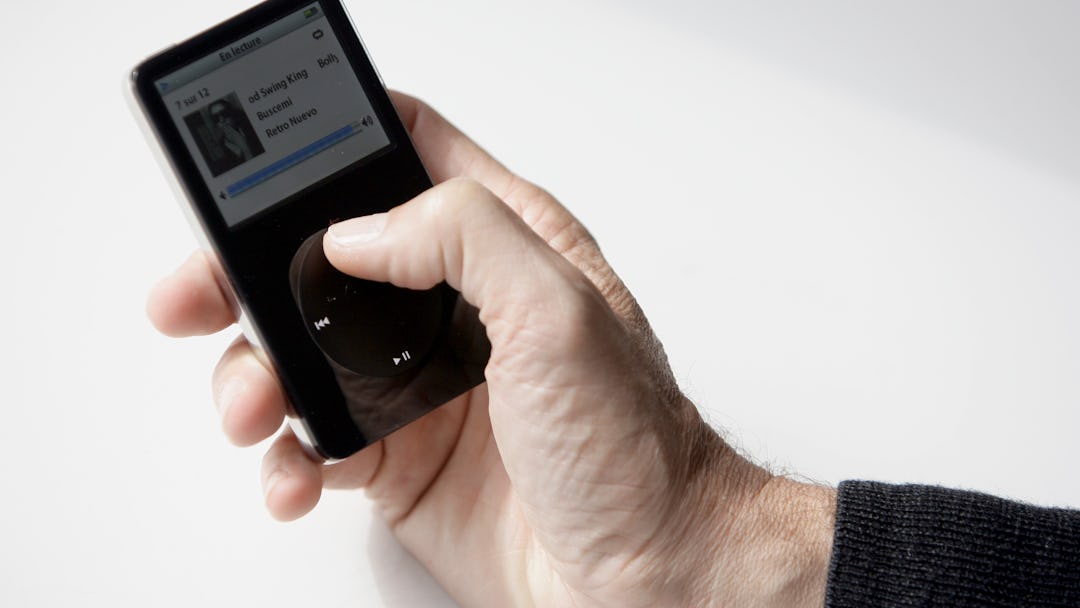So there was an Apple event yesterday. Didja hear? There was a bit of coverage. Most of it focused on the zippy new iPhone 6, or the totally logical and necessary iWatch (seriously, I stopped wearing watches because of my iPhone, the snake is eating its own tail here), or the surprise free album by U2. But it also marked the official end of the “iPod Classic” — which, like Coca-Cola Classic, used to just be the damn iPod — and nobody seems to care all that much. Gizmodo offered up 134 words in its “RIP iPod Classic” post; Engadget’s “RIP Click Wheel” clocks in at 137 words. Pitchfork could only spare 79. Perusing such half-assed obits, your correspondent felt weirdly old and out of touch, like the last guy wandering into K-Mart asking what they did with all the 8-Tracks. Am I the only one who mourns for the iPod?
Maybe. It’s worth noting that the defensiveness here comes at least partially from being, by any reasonable definition, a music hoarder. Currently, the Bailey iTunes library contains (including that free U2 album — thanks, lads) just over 50,000 tracks, taking up about 458 GB. Granted, a lot of that is spoken word stuff (comedy albums, radio shows, archived podcasts, etc.), but a good three-quarters of it is music: digital purchases, rips from CDs, rips from friends’ CDs, rips from library CDs, downloads from mp3 blogs. (I’m among friends here, right?) And it’s spread out, via an intricate system of playlists and autofills, over three iPods, purchased over several years, the most recent of them the final, largest, circa-2007 160GB iteration.
Why, you may (quite reasonably!) ask, am I still doing all of this the old-school way, rather than streaming from clouds and Spotify, like the kids do these days? Part of it is logistics — I do a lot of my listening on the subway, where, guess what, no Internet. (Also, less of this stuff is on Spotify than its boosters would have me believe, and there’s only so much I’m willing to spend on a “cloud.”) But there’s also a sentimental attachment to these devices, and what they came to stand for in the lives of music enthusiasts.
I was a fairly early adopter of the iPod — not first generation, mind you, but the second-gen model, purchased in January of 2004 for the tidy sum of $399. It only held 10GB, but subsequent models held more, much more, and filling them became the digital equivalent of George Carlin unpacking in a hotel room: “We got more places than we got stuff! We’re gonna hafta buy more stuff!” It all went in, ripped and downloaded and stuffed into that iTunes library that I spent good God so much time curating.
On second thought, “curating” might be too strong a word for it. Though my mild case of undiagnosed OCD is certainly present there (all tracks and albums carefully titled, matched up to accurate album covers, and separated into genre), it’s an unruly collection of music I’ve listened to many times over and can sing along with unconsciously, right up alongside tracks downloaded on a whim and still unfamiliar. All of it, from all the genres and all the timeframes and all the sources, dumps onto that iPod, and having that much music in your pocket makes you a less disciplined listener, but it also makes you a more open one — willing to try anything, because what the hell, it’s not like you’re gonna run out of room.
For the time being, that remains an option. But when these little bricks die, I won’t be able to replace them, and I can’t imagine I’m the only musical pack rat for whom this is a sad realization. Some of this is a generational concern; we’re dealing in digital music but still on a tangible device, and letting go of it is part of a continuing shift away from physical media that doesn’t go down easy for many of us. The shrugging response to the death of the iPod is peculiar from a historical standpoint — this was quite literally a revolutionary device, one that played no small role in making Apple the force that it has become. But the end of the iPod era is more personal than that; it means that the day will come, and soon, when you can no longer play this game of musical roulette, where you click “Shuffle Songs” and see what happens.
